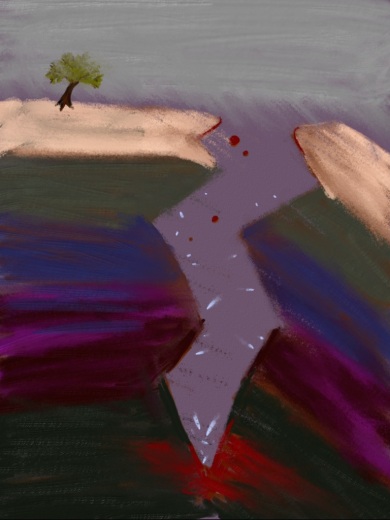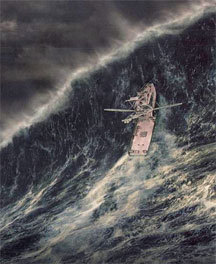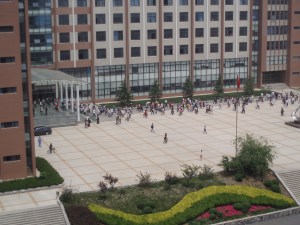
Forgiveness, like the buds of springtime, bring a new breath to the world
We went into the countryside with some colleagues of my husband’s today. Four cars wound their way between the rocky and green-covered hills. My daughter made instant friends with one of the school’s administrators. Throughout the day she called her “The Pink Lady”, though I reminded her of LinLin’s name constantly. She was given this moniker because she wore a pink t-shirt, the same shade of fuchsia as our little goose’s Dora t-shirt.
As we drove along, I was astonished at the change in the landscape. Five years ago, this was my commute, through green hills with orchards and the occasional countryside village with ancient dwellings (probably more than 20-years old, ancient here). Now this area has developed into the software corridor. Villages have been razed, and quaint condominium style developments are tucked into to the folds of the rising hills. A small river has been dammed to create a little lake. We stopped for a “scenic view”. The foliage was lovely: recently planted bushes with light green leaves that went pink at the tips of branches, wild flowers, young trees. A board walk led us down nearer to the lake, which was not accessible, and then led us back up to the road. Across from the lake were the unmistakable signs of “progress”. More condos being built.
When we arrived at our destination, we played, as the Chinese say. Playing is something everyone does. It’s not just for children. We hiked up the mountain a bit. Half the party turned back for lack of proper shoes. They returned to the “restaurant” at which we were to have lunch. It was a court-yard building. A vegetable garden filled the courtyard. The dining rooms and a pillared porch surround it. One of the side-rooms held a pool table and several ping-pong tables. Card tables were set up in another room. While some hiked, others knocked balls around. When lunch was ready, we all descended upon it like ravenous wolves. Lamb on spits were laid out before us, supported by notches carved into the table, and reinforced with marble. It had been roasted for hours with spices and apples and pears. I have never had such glorious lamb. We were all given plastic gloves with which we ripped the meat from the bones. While we gorged, separate tables were set for the “second” course. I couldn’t imagine how we would fit anything else in. But the lamb made an excellent broth for a vegetable hot-pot. A fire was lit below the pot of broth, and we were all served small bowls with green onions and another herb, fresh from the garden. In fact, all the vegetables that went into the broth were from the garden outside our door. In deed, we were able to pack more in to our bellies.
I go into such detail because there was a quality to the day that I haven’t experience in a long time. The colors were brilliant. My little girl chanted the colors of the flowers that lined the road: “Orange flowers! Pink flowers! Red Flowers! Look, Mommy! I see purple flowers!” And I felt her same excitement. The rain that brought the hikers in was a deliciously cool mist. The smells of the herbs and vegetables growing in the courtyard, the roasting of the lamb, and then the flavors of those same delicacies bursting in my mouth at the dining table. It was a lack of grief that enlivened my senses. It is not a complete lack. I still have work to do. But at least now I know the nature of the work.
It is forgiveness.
I have learned something about the process of grief and loss. The “final” part of the process is acceptance. I qualify it as “final” because it is not necessarily finished. It can be a cyclical process, and one can experience a range of emotions related to grief and loss, not necessarily in any order, or even singularly. Yes, they can pounce on you more than one at a time. But this acceptance thing has been holding me back because my loss has not been of a definite nature, as death is. When children alienate themselves from a parent, there is a toxic mix of shame, bitterness, resentment, guilt and anger thrown into the pot, and the ever-present reminders on Facebook of those who have rejected you. There is the hope, the dreams, the longing.
So I’ve had some forgiving to do. Over the years, I thought I had “done” that. I had asked my ex-husband for forgiveness for my wrongs in our marriage. I had been able to see those who have done things to hurt me have been hurt themselves, and had done some forgiving. But that forgiveness had all been an intellectual exercise. My head got it, but my heart kept shouting, silently, “But, but, but!” Every time I went through that exercise I asked myself, “Why do I have to keep doing this?” It hurt. It wasn’t fun. It didn’t bring me any peace.
I let myself get angry this weekend. I let myself feel hatred and the rage. I’ve never done that before. It wasn’t “nice.” But this time, I let myself speak the unspeakable wishes to one of my wrong-doers. I cursed her. I pictured myself doing, and spoke out loud, the things I would do to hurt her, so she would know the pain she has caused. I went deeper and deeper into this until I could do no more, until all I could do was see my children, and remember that this woman is their loved one. And then, slowly, I began to forgive myself for all of it, for the hatred and the anger towards this fragile human being. I began to feel how much I had broken her with my own thoughts, bitter and resentful. I began to see her as bandaged from head to toe. And I began to forgive her. I won’t forget what she has done, and I haven’t excused it. But that’s not what forgiveness is. “Forgiveness is giving up the hope that the past could be any different.” I let go of her. She doesn’t take up space rent-free in my heart any more, blocking my love with what I imagined her to be. I have to thank Oprah and Iyanla Vanzant for that quote. I admit it. I did an internet search on how to forgive, and found Oprah’s Lifeclass on the Power of Forgiveness. With lessons taught by powerhouses like Deepak Chopra and Tony Robbins, it is quite useful if you need some guidance. I sure did. Don’t expect to be able to transform while your watching, though. Just take the lessons, and chew on them till you can digest.
Today confirmed for me that this forgiveness is sticking. Peace floods through me when I think of it, and of that woman. And I felt the brilliance of the flowers, and tasted the juices of that lamb today, more intensely than I have sensed things in years. My heart is tender, but not as painful. I have more forgiving to do. I need a lot more practice before it is an automatic thing. But at least I know what I need to do now. And for that, and for forgiveness, I am grateful.
Read Full Post »








